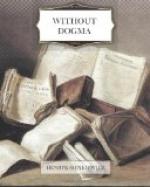One word more about my abilities before concluding the synthesis. My father, my aunt, my colleagues, and sometimes strangers, consider them simply prodigious. I allow that my intellect has a certain glitter. But will the improductivite Slave scatter all the hopes invested in me? Considering all I have, or rather have not done up to this day, either for others or myself, I feel inclined to think that such will be the case. This confession costs me more than appears on the surface. My irony when I think of myself tastes bitter on the palate. There was something barren in the clay from which God formed the Ploszowskis, since on that soil everything springs up and grows so luxuriously, yet produces no fruit. Truly, if with this barrenness, this powerlessness to act, I possessed the abilities of a genius, it would be a strange kind of genius,—a genius without portfolio, as there are ministers of state without portfolio.
This definition, “a genius without portfolio” seems to fit me to perfection. I shall take out a patent of invention for the word. But the definition does not apply to me alone. Its name is legion. Side by side with the improductivite Slave goes the genius without portfolio; it is a pure product of the Slav soil. Once more I say its name is legion. I do not know another part of the world where so much ability is wasted, in which even those who bring forth something give so little, so incredibly little, in comparison with what God gave them.
ROME, BABUINO, 14 January.
Another letter from my aunt urging me to come. I am coming, I am coming, dear aunt, though God knows I am doing it out of love for you; otherwise I should greatly prefer to remain where I am. My father seems not well; from time to time he feels a strange numbness on the whole of his left side. At my urgent entreaties he has seen a physician, but I am quite sure the physic he received is safely stowed away in a cupboard, according to an old custom he has. Once he opened the mysterious receptacle and showed me a whole collection of bottles, pill-boxes, and powders, saying: “For mercy’s sake! this would kill a strong man, let alone a sick one.” Up to now, this quaint way of looking upon medicine has not done him any harm, but I am troubled about the future. Another reason for my unwillingness to go is my aunt’s plan of campaign. Of course she is anxious to see me married. I do not know whether she has anything definite in view. God grant I may be wrong; but she does not deny the intention. “About an eligible parti like you,” she writes, “there will be at once a war of the roses, you may be sure of that.” I am tired and do not wish for any war, and least of all to end it like Henry VII. by a marriage. On the other hand,—I dare not tell my aunt, but may confess it to myself,—I do not like Polish women. I am thirty-five, and like other men that live much in society, I had my sentimental passages, among others, with Polish women, and from




